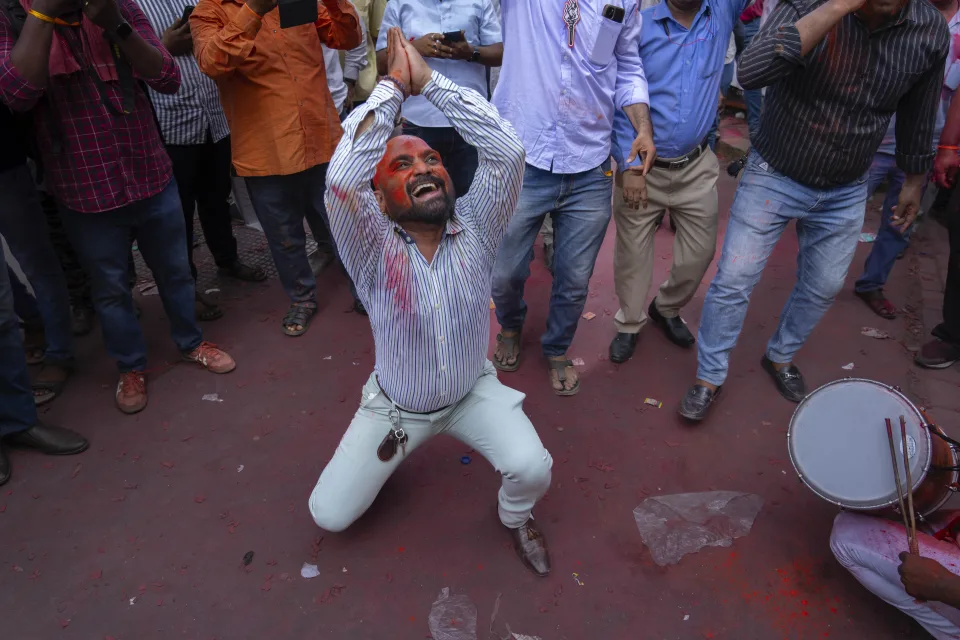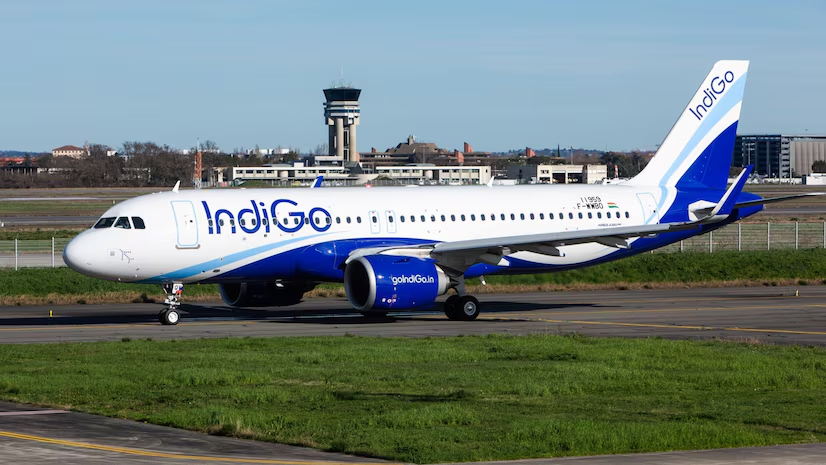NEW DELHI (AP) — Prime Minister Narendra Modi has declared victory for his coalition in India’s general election, claiming a mandate to push his agenda even though his party lost seats because of a stronger-than-expected opposition that pushed back on his mixed economic policies. registration and conscription policy.
“Today’s victory is a victory for the world’s largest democracy,” Modi told a crowd at his party headquarters on Tuesday. He said Indian voters have “shown great trust” in his party and the National Democratic Alliance coalition.

Official results released by India’s Election Commission on Wednesday showed the NDA won 294 seats, more than the 272 needed to win a majority but far short of expectations.
For the first time since the Hindu nationalist Bharatiya Janata Party came to power in 2014, it did not win a majority on its own, winning 240 seats – far short of the record 303 seats it won in the 2019 election.
That means Modi will need the support of other parties in his coalition, a surprise setback for the 73-year-old president who had expected a landslide victory. During his election campaign, Modi said his party would likely win 370 seats and its allies 30.
It is now up to the support of key allies, including the Telugu Desam Party, which has 16 seats in the southern state of Andhra Pradesh, and the Janata Dal (United), which won 12 in the eastern state of Bihar, as well as smaller groups.
“Indian voters cannot be taken for granted,” the Times of India said in an editorial. “Voters have clearly signaled that jobs and economic aspirations matter. The economic message from the results is that jobs matter.
The Congress won 99 seats, improving its tally from 52 in the 2019 elections, with one of its key allies, the Samajwadi Party, winning 37 seats in the northern state of Uttar Pradesh in a major upset for the BJP. The All India Trinamool Congress won 29 seats in West Bengal and the Dravida Munnetra Kazhagam has 22 seats in the southern state of Tamil Nadu.
The opposition All India Alliance won a total of 232 seats.
The BJP can now “depend a lot more on the goodwill of its allies, making them important players from whom we can expect to do their best in terms of both policymaking and government formation”, said Milan Vaishnav, director of the Centre for South Asia Programme at the Carnegie Endowment for International Peace.
“At the very least, the result vindicates Prime Minister Modi’s authority. He made this election happen for himself,” said political commentator Pratap Banu Mehta. “Today, he has become just another politician despised by the people,” he said in an article published in the daily Indian Express.
More than 640 million votes were cast in the six-week-long marathon election in the world’s largest democratic exercise.
Faced with a sudden drop in the BJP’s support, rivals claimed they too had won a victory of sorts, with the main opposition Congress party saying the election was a “moral and political loss” for Modi.
“This is a victory of the people and a victory of democracy,” Congress party leader Mallikarjun Kharge told reporters.
Despite the setback, Modi vowed not to back down from fulfilling his election promise to transform India’s economy from the current fifth place to the world’s third largest and to move forward in implementing his agenda.
He said he would, among other things, boost India’s defence production, increase employment opportunities for youth, increase exports and help farmers.
“This country will see a new chapter of big decisions. “That’s Modi’s guarantee.”

Many of the Hindu nationalist policies he instituted over the past ten years will also remain in place.
Modi’s victory was only the second time an Indian leader retained power for a third term, after the country’s first prime minister, Jawaharlal Nehru. Before Modi came to power, India had coalition governments for 30 years.
Leaders from countries in the region, including neighbouring Nepal and Bhutan, congratulated Modi, while the White House praised India for a “vibrant democratic process”.
During his 10 years in power, Modi has transformed India’s political landscape, bringing Hindu nationalism, once a fringe ideology in India, into the mainstream while leaving the country deeply divided.
His supporters see him as a self-made and strong leader who succeeded in improving India’s standing in the world. His critics and opponents say his Hindu-first policies have bred intolerance while the economy, once one of the world’s fastest-growing, has become more unequal.
For Payal, a resident of the northern city of Lucknow who uses only one name, the election was about the economy and the large number of people living in poverty in India.
“People are suffering, there are no jobs and people are in a situation where their children have to make tea and sell it on the roadside,” Payal said. “This is a big deal for us. If we don’t wake up now, when will we?”
Rahul Gandhi, a prominent face of the opposition Congress party, said he sees the election numbers as a message from the public.
“The poorest people in this country stood up for the Constitution of India,” he said at a press conference.
Modi’s popularity has outstripped that of his party during his first two terms in office, and he has successfully turned parliamentary elections into a presidential-style campaign, with the BJP riding on the leader’s brand.

“Modi was not just the main campaigner, he was the only campaigner in this election,” said public policy researcher Yamini Aiyar.
Critics say India’s democracy has come under increasing pressure under the Modi government because of strong-arm tactics used to subjugate political opponents, clamp down on independent media and stifle dissent. The government rejects such allegations and says democracy is flourishing.
Economic discontent has also worsened under Modi. Although stock markets have reached unprecedented levels, the youth unemployment rate is skyrocketing, and only a small segment of Indians have benefited from the boom.
As the election began in mid-April, a confident BJP initially focused its campaign on the “Modi guarantee,” highlighting economic and social achievements that its party says have reduced poverty. “India will become a developed country by 2047 when Modi comes to power,” it repeated at rally after rally.
But the campaign has become increasingly rowdy, with Modi stepping up his polarizing rhetoric, targeting Muslims, who make up 14% of the population, a strategy seen as energizing his core Hindu majority electorate.
The opposition India Alliance attacked Modi for his Hindu nationalist policies and campaigned on issues of unemployment, inflation and inequality.
“These issues resonated and had an impact,” said Ayar, the public policy researcher.



